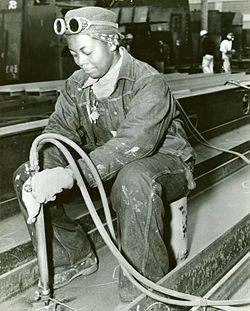African American
 From Rationalwiki
From Rationalwiki 
| Checking our privilege Social justice |
| Not ALL of our articles |
“”I am America. I am the part you won't recognize. But get used to me – black, confident, cocky; my name, not yours; my religion, not yours; my goals, my own. Get used to me.
|
| —Muhammad Ali |
African Americans (or African-Americans, also called Black Americans) are the second largest ethnic group in the United States, after European Americans (although it could be said they have recently been overtaken by Hispanic Americans, though they are not an ethnicity and rather are a cultural group).[2] The term "African American" is sometimes restricted to the descendants of slaves forcibly brought to America by the aforementioned Europeans; however, there are also more recent immigrants from Africa—or from the Caribbean, another area where Africans were moved as slaves—who don't identify as American, having lived in nations or territories previously or currently claimed by European colonial interests (such as Great Britain, France, Germany, Portugal, the Netherlands, and Spain).
History[edit]
African slaves in America were generally from west Africa, in an area from the western Sahara area down to the Congo region. A handful came from other areas such as modern day Mozambique but this was not common. They were often bought in coastal areas of Africa, or brought there by other Africans. Despite some recent claims, the vast majority of these Africans were not Muslim, or even Jewish by religion, but had tribal beliefs (you didn't think voodoo was Muslim, did you?). Some were baptized not long after arrival in the New World.
Conditions in slave ships were appalling with many dying en route. People from different tribes were jumbled together sometimes with no language in common. Despite this some African words appear to have survived in the USA. Most of the slaves were illiterate, although some evidence suggests a few could read and write Arabic. Others learned to read and write later.[citation needed]
Not all African slaves in North America were in the British colonies. The USA gained a new slave population when it took Florida from Spain and Louisiana from France. Hispanics also have some African ancestry, and some slaves were also transported from the Caribbean to the USA. Some Native American tribes, notably the Cherokee, kept black slaves as well. In the American War of Independence, African Americans fought on both sides, with the British offering freedom to some of their supporters. Many of these African American loyalists would later move to Canada. A significant number of the USA's Founding Fathers owned slaves and appear to have seen no contradiction in this (others, such as Jefferson, saw the contradiction and spoke out against slavery, but when push came to shove, just couldn't give up the standard of living that they gained through owning slaves).
For most of the history of the US, African Americans were, de jure or de facto, denied most of the liberties granted to other Americans. The American Civil War, Reconstruction, and the Civil Rights movement were all attempts to remedy this; however, it was only the latter movement, which permanently removed discriminatory provisions from the law, that achieved any sort of lasting success.[citation needed]
Despite the name, most African Americans now have some European ancestry (usually on their male lines), with smaller percentages of Native, Asian and Hispanic input. This is confirmed by genetic testing. A lot of this dates from the time of slavery, and was out of wedlock or unrecognized. It is partly to do with the sexual coercion and rape of the slavery period, but also on the other side because genuinely loving mixed race couples were long dissuaded from marriage, sometimes by force. The latter tendency occurred well into living memory.[citation needed]
In spite of their minority status in American society, African Americans have been a strong influence on American culture for well over a century, influencing American traditions in fashion,[3] cuisine,[4] art,[5] entertainment,[6] and sport.[7] Arguably the most significant impact is how African American culture changed American music. African American culture was the primary driving force behind many popular music genres originating in the late 19th century to the early 20th century, such as jazz,![]() ragtime,
ragtime,![]() and the blues.
and the blues.![]() [8] In the 1940s, these influences morphed into the genre known as rhythm and blues,
[8] In the 1940s, these influences morphed into the genre known as rhythm and blues,![]() which paved the way for rock and roll
which paved the way for rock and roll![]() (a hybrid of R&B and country music)
(a hybrid of R&B and country music)![]() in the 1950s.[9] Soul music
in the 1950s.[9] Soul music![]() followed in the 1960s by artists integrating elements of African-American gospel music
followed in the 1960s by artists integrating elements of African-American gospel music![]() with R&B.[10] The 1970s brought the genre of funk music,
with R&B.[10] The 1970s brought the genre of funk music,![]() which built on the traditions of R&B, but exchanged the typical backbeat rhythm in favor of a rhythm driven by a strong downbeat.[11] The 1970s also were the beginnings of the music genre of hip-hop,
which built on the traditions of R&B, but exchanged the typical backbeat rhythm in favor of a rhythm driven by a strong downbeat.[11] The 1970s also were the beginnings of the music genre of hip-hop,![]() which originated with DJs using turntable skills to emphasize instrumental "breaks" of R&B, soul, and funk songs. The genre later expanded to add rapping
which originated with DJs using turntable skills to emphasize instrumental "breaks" of R&B, soul, and funk songs. The genre later expanded to add rapping![]() over the breaks.[12] In the 1980s, African American artists, blending the above traditions with European synthesizer music, laid down the foundation for electronic dance music
over the breaks.[12] In the 1980s, African American artists, blending the above traditions with European synthesizer music, laid down the foundation for electronic dance music![]() in the form of house music
in the form of house music![]() and techno.
and techno.![]() [13] The impact of this music often was not just limited to America; rather, it was felt around the world.[14][15]
[13] The impact of this music often was not just limited to America; rather, it was felt around the world.[14][15]
Distinct nation[edit]
There are those who see African Americans as a distinct nation within the United States, and many African American leaders once fought to have a distinct state. (The republic of Liberia was originally set up for this, but abandoned when it was found that most African Americans did not want to live in Africa.) However, in the modern political climate, this is a fringe opinion, adhered to only by such groups as Louis Farrakhan's Nation of Islam.[citation needed]
Ironically, African Americans' commonalities in culture, history and speech — which are often invoked in this regard, are partly the result of slavery, segregation and racism. It should also be remembered that a great deal of African American idiosyncrasies do not come from Africa (or even Europe), but are a positive reflection of the creativity, innovation, versatility and resourcefulness of African Americans since their arrival in America.[citation needed]
Presidents[edit]
Barack Obama, the 44th President of the United States, is African American through his Kenyan father and still has close relatives in Africa. Contrary to popular belief, he is descended from slaves through his white mother.[16] Unlike the majority of African Americans, he is of mainly east African descent.
There is speculation that other presidents, notably Lincoln and Jefferson, were of African American lineage.[17]
Embarrassing side effects[edit]
As the term "African American" has gained popularity, an interesting side effect has been observed among Americentric white people: They tend to call all black people "African Americans".
In 2015, Men's Health News reached multiple levels of absurdity when it speculated that actor Idris Elba, who is a British citizen of Sierra Leonean and Ghanaian descent, might become the first "African-American" James Bond, apparently forgetting that African Americans are, by definition, U.S. citizens.[18] Yes, that James Bond: the hero of Her Majesty's Secret Service who guest-starred with Queen Elizabeth II in the opening ceremony of the 2012 London Olympics and took orders from Dame Judi Dench. Whether Elba gets the role or not, an American of any ethnicity working as MI-6's most trusted 00 agent would be a first indeed.
Also, Mavis Leno, wife of Jay Leno (of "Jaywalking" fame, ironically) once appeared on his show to discuss the treatment of "African Americans" in South Africa.[citation needed]
A similar but somewhat rarer case of stupid can occur when discussing Melanesians, who are neither African nor American.
Another effect is the reflection of the first: thinking that all Africans are black, part of the issue of treating Africa like a country rather than the world's second largest continent. Much of northern Africa, for example, is populated by those of Arabic and Egyptian descent. South Africa, on the other hand, contains a comparatively-large Caucasian populace descendant from British and Dutch colonists, as well as a significant Indian population. Madagascar is largely a mix of African and Malay peoples with a dash of Polynesian ancestry.
Taking it to the absurd[edit]
As the "Out of Africa"![]() theory of the common ancestor of homo sapiens reaches scientific consensus, it can also be effectively argued that every person (including every American) is technically African to a degree.
theory of the common ancestor of homo sapiens reaches scientific consensus, it can also be effectively argued that every person (including every American) is technically African to a degree.
See also[edit]
- African American Vernacular English, colloquially known as "jive"
- Afrocentrism, a pseudo-academic interpretation of history. It can be seen as an overcompensation mechanism for the past treatment and marginalization of African culture.
External links[edit]
References[edit]
- ↑ "NAACP Celebrates the Life of Muhammad Ali"
- ↑ US Census data
- ↑ "How African Americans Have Influenced Style and Culture" by Constance C.R. White, Time, 2018 February 6
- ↑ "How Black history and culture have influenced American cuisine"
- ↑ "10 great Black moments in the history of American art" by Alicia Eler, Star Tribune, 2021 February 22
- ↑ "13 Black Actors, Directors and Comedians Who Made History in TV and Film" by Latifah Muhammad, ET, 2021 February 2
- ↑ "A History of African-American Athletes" by Zeke Fuhrman, Bleacher Report, 2008 October 24
- ↑ "Musical Crossroads: African American Influence on American Music", Smithsonian Music, September 2016
- ↑ "The 50s: A Decade of Music That Changed the World" by Robert Palmer, Rolling Stone, 1990 April 19
- ↑ "Exploring the History of Black Music Month", Music Forward foundation, 2020 June 25
- ↑ "Evolution of Funk (Early Funk and P-Funk)", recordingarts.com
- ↑ "Hip-Hop: A Culture of Vision and Voice", The Kennedy Center
- ↑ "Midwest Electric: The Story of Chicago House and Detroit Techno", Afropop Worldwide, Produced by Wills Glasspiegel & Marlon Bishop, 2011 June 14
- ↑ "When Jazz Ruled The World: The Rise And Reign Of America’s One True Art" by Charles Waring, UDiscoverMusic, April 1 2021
- ↑ "Rap Goes Global, On A Local Level" by Richard Smirke, Billboard, 2019 October 17
- ↑ Ancestry.com Discovers Ph Suggests
- ↑ The Black Presidents of United States of America
- ↑ Eric Spitznagel (October 9, 2015). "Why Idris Elba Should Be the Next James Bond".
Categories: [Culture] [Ethnic groups] [United States politics] [Social justice]
↧ Download as ZWI file | Last modified: 11/08/2025 14:30:32 | 235 views
☰ Source: https://rationalwiki.org/wiki/African_American | License: CC BY-SA 3.0

 KSF
KSF